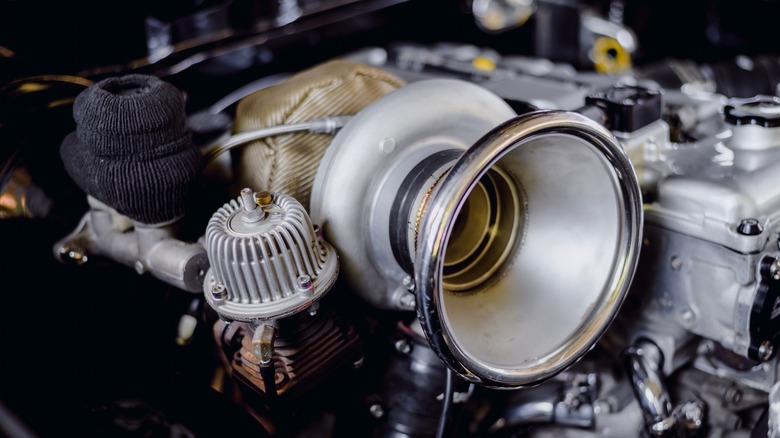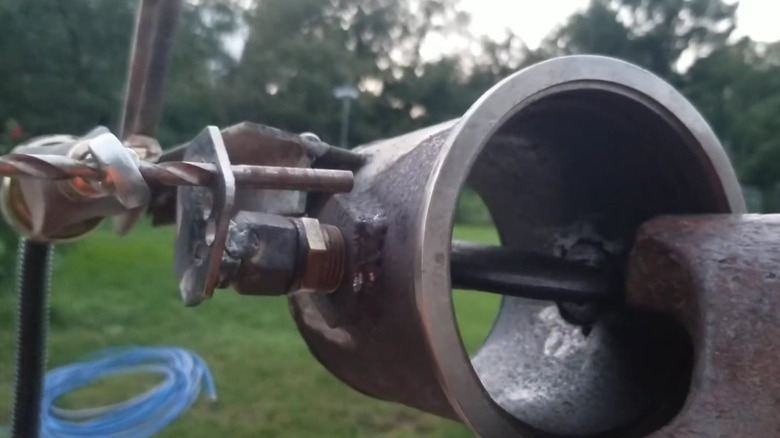What Is An Exhaust Brake On A Diesel Engine And How Does It Work?
In any automotive braking system, the linchpin factor is pressure. When you press on the brake pedal in your car, for instance, pressurized brake fluid is distributed to the pistons in wheels, which presses high-friction material like brake pads or drum brakes into the wheels. This slows their spinning and brings the car to a stop.
Now, that's all well and good for your everyday family sedan, but what about a real rip-roarer of a vehicle, such as a massive diesel-powered big rig truck? Big trucks have regular brakes, of course, but when you've got that much muscle propelling that much weight down the highway, a gaggle of high-friction pads may not be all you need to safely slow things down.
This is why some heavy-duty diesel-powered vehicles employ supplementary braking systems to put a little extra oomph into their stopping power. One such example is exhaust brakes: Much like your regular brakes, exhaust brakes make use of pressure to slow things down, but do so in a completely different way centered on the vehicle's engine, rather than its wheels.
An exhaust brake is a controllable valve built into the exhaust system
While you may expect anything to do with braking in your vehicle to be built into or around your wheels like regular brakes, exhaust brakes actually have nothing to do with your wheels. The whole process takes place in the back of your diesel engine via a controllable valve built into the exhaust system. Normally, whether you're using a diesel engine or gas engine, exhaust is produced in the engine's cylinders following the usual combustion process. That exhaust is vented out of the engine via a separate valve, where it travels to and pops out of the tailpipe.
If a vehicle is equipped with an exhaust brake system, though, an additional valve is added to the inner workings of the exhaust pipes. This valve can be directly controlled by a switch on the driver dashboard. When it's engaged, the valve closes slightly — not enough to completely halt the flow of exhaust out of the vehicle, but enough to have a tangible impact on how quickly and smoothly the exhaust travels through the pipe and exits.
Exhaust brakes force the engine to run slower, reducing speed
Why exactly would you want to block the flow of exhaust out of your diesel engine? By partially blocking the flow of exhaust, the exhaust gets backed up within the engine. This essentially forces the engine to dedicate part of its power to just pushing exhaust out of the smaller gap. With the engine's power divided, its rotational power decreases, reducing its overall output. Naturally, when the engine's output is reduced, the vehicle starts to slow down.
If you combine this engine-slowing function with your existing hydraulic brakes, then even the beefiest of big rigs can be safely slowed to a stop. This makes exhaust brakes invaluable for handling steep inclines where a truck driver needs to have much more minute control over their vehicle. As an added bonus, the extra stopping power from an exhaust brake system helps to take some of the load off of the wheel brakes, which lowers the chance that they'll overheat and malfunction in stressful situations. That reduced stress also means you won't need to swap out your brake pads as often.
Exhaust brake systems can come standard on some heavy-duty diesel vehicles. They're also fairly easy to install aftermarket, as they don't require any particular tinkering with the brake lines or wheel air pressure like aftermarket wheel brakes.

